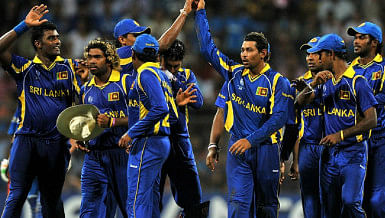When refuting the notion that Shakib Al Hasan's excellent performances made Bangladesh a one-man army on the eve of yesterday's match against Australia, skipper Mashrafe Bin Mortaza was probably thinking about the 384 runs Shakib scored in four matches. While the world's number one all-rounder has not stormed through opposition with his left-arm spin so far in the World Cup, it was proved to Bangladesh's detriment yesterday just how important Shakib's role is in the bowling attack.
Australia racked up a monumental 381 for five in 50 overs, scoring an eye-watering 131 runs in the last 10 overs. Shakib, even though he did not bowl in the last 10 overs, conceded 50 runs in six overs. Like in the matches against South Africa and New Zealand -- arguably Bangladesh's best bowling performances in this World Cup -- Shakib had come on fairly early on, in the 10th over of Australia's innings.
Before that, skipper Mashrafe Bin Mortaza and Mustafizur Rahman had done a pretty good job of keeping Australian openers David Warner and Aaron Finch restrained. It was not the 32 for one that the West Indians were held to after the first 10 overs, but on a flat pitch and not having taken a wicket, 47 without loss after nine set the stage for the spinners in Shakib and Mehedi Hasan Miraz to tie things down further.
As Mashrafe had been reminding everyone, Bangladesh do not have bowlers who can run through sides but rely on bowling as a unit. That of course means that it is important that a bowler does not have a particularly bad day and with the role given to him to build pressure with tight bowling, especially in the middle overs, it better not be Shakib having the off day. Unfortunately for Bangladesh, Shakib had his off day against perhaps the toughest opposition on a flat wicket and a lightning-fast outfield.
His figures may compare favourably with that of Rubel Hossain, who gave away 83 runs in nine overs, but while Rubel suffered greatly in the last 10 overs, Shakib allowed easy runs when Australia were not even looking for boundaries. None of his overs, save the fifth, went for less than six runs. Australia eased into the middle overs during Shakib's first spell, which cost 24 runs from three overs. After Soumya Sarkar's surprise wicket of Finch, Shakib was brought on in the 31st over in hopes of halting a budding partnership between Usman Khawaja and Warner, but gave away 13 runs in his two overs.
Against South Africa in Bangladesh's World Cup opener, Shakib was the one who stopped the Proteas' momentum with seven overs that cost just 25 runs and yielded the wicket of Aiden Markram. Against New Zealand, it was Shakib's spell up front, when he dismissed openers Martin Guptill and Colin Munro in a seven-over spell that started from the sixth over. Those early strikes and also his next three overs that cost just 11 runs formed a crucial part of a bowling effort that nearly defended 243.
Against the West Indies on Monday, Shakib was brought on in the 21st over and while he was expensive, conceding 43 runs in seven overs, he took the wickets of a dangerous-looking Evin Lewis and Nicholas Pooran.
Yesterday, and indeed against England when Bangladesh conceded 386, Shakib was neither incisive nor economical. Unlike against England, who kept a run rate of more than six an over since the eighth over of the innings, Australia were kept below the mark till the 38th over. In such a scenario, a Shakib bowling in his usual manner may have made a big difference.
It also goes to show how consistent and reliable he has been with the ball, as Bangladesh's bowling efforts have been built around a good performance from the all-rounder. One-man army they may not be, but yesterday it seemed that Shakib was the keystone in the arch of Bangladesh's bowling.


 For all latest news, follow The Daily Star's Google News channel.
For all latest news, follow The Daily Star's Google News channel. 









Leave your comments